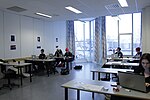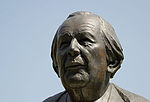Search results
Appearance
The page "Cognitive learning theory" does not exist. You can create a draft and submit it for review or request that a redirect be created, but consider checking the search results below to see whether the topic is already covered.
- 1990s, cognitive load theory was applied in several contexts. The empirical results from these studies led to the demonstration of several learning effects:...42 KB (4,995 words) - 18:25, 1 October 2024
- be acquired by observing and imitating others. It states that learning is a cognitive process that takes place in a social context and can occur purely...49 KB (6,223 words) - 09:58, 28 July 2024
- Learning theory describes how students receive, process, and retain knowledge during learning. Cognitive, emotional, and environmental influences, as well...53 KB (6,664 words) - 22:55, 10 August 2024
- foundations of social cognitive theory come from Edwin B. Holt and Harold Chapman Brown's 1931 work Animal Drive and the Learning Process, an essay toward...56 KB (7,062 words) - 02:00, 5 October 2024
- E-learning theory describes the cognitive science principles of effective multimedia learning using electronic educational technology. Beginning with...39 KB (5,243 words) - 00:02, 7 September 2024
- Piaget's theory of cognitive development, or his genetic epistemology, is a comprehensive theory about the nature and development of human intelligence...87 KB (10,344 words) - 19:28, 15 August 2024
- Modern Group That Predicted the Destruction of the World (1956) and A Theory of Cognitive Dissonance (1957), Leon Festinger proposed that human beings strive...117 KB (14,197 words) - 15:50, 28 August 2024
- A cognitive architecture refers to both a theory about the structure of the human mind and to a computational instantiation of such a theory used in the...18 KB (1,256 words) - 18:05, 27 September 2024
- importance of sociocultural learning in his theory of social constructivism, highlighting how interactions with adults, peers, and cognitive tools contribute to...56 KB (6,253 words) - 12:52, 15 September 2024
- The psychology of learning refers to theories and research on how individuals learn. There are many theories of learning. Some take on a more behaviorist...37 KB (4,723 words) - 21:19, 6 March 2024
- education) E-learning (theory), a cognitive science of effective multimedia e-learning Instructional theory Social cognitive theory Social learning theory Algorithmic...1 KB (141 words) - 12:15, 13 January 2022
- Constructivist approaches to human learning have led to the development of the theory of cognitive apprenticeship. This theory accounts for the problem that...13 KB (1,685 words) - 23:28, 8 April 2024
- Cognitivism (psychology) (redirect from Cognitivism (learning theory))cognitive theory seeks to explain the process of knowledge acquisition and the subsequent effects on the mental structures within the mind. Learning is...20 KB (2,390 words) - 14:10, 8 September 2024
- conceptual resources, perceptual skill, language learning, and other aspects of the developed adult brain and cognitive psychology. Qualitative differences between...66 KB (8,179 words) - 23:14, 15 May 2024
- Information processing theory is the approach to the study of cognitive development evolved out of the American experimental tradition in psychology. Developmental...25 KB (3,451 words) - 19:17, 6 June 2024
- of a Theory of Human Problem Solving". Ulric Neisser's 1967 book Cognitive Psychology was also a landmark contribution. Prior to the cognitive revolution...30 KB (3,699 words) - 15:51, 2 October 2024
- education contains a number of learning theories that specify how students learn music based on behavioral and cognitive psychology. While formal music...11 KB (1,221 words) - 22:01, 20 April 2024
- neuroscience, cognitive psychology, physiological psychology and affective neuroscience. Cognitive neuroscience relies upon theories in cognitive science coupled...36 KB (3,844 words) - 12:05, 1 September 2024
- Instructional design (redirect from Learning Design)traditional cognitive learning theory. Constructivists believe that learning experiences should be "authentic" and produce real-world learning environments...65 KB (7,159 words) - 17:55, 27 September 2024
- Learning styles refer to a range of theories that aim to account for differences in individuals' learning. Although there is ample evidence that individuals...68 KB (7,711 words) - 15:46, 26 September 2024
- A cognitive architecture can refer to a theory about the structure of the human mind. One of the main goals of a cognitive architecture is to summarize
- The Theory of the Leisure Class (1899) by Thorstein Veblen The Higher Learning as an Expression of the Pecuniary Culture 4022800The Theory of the Leisure
- adult learning theories encompass the basic concepts of behavioral change and experience. From there, complexities begin to diverge specific theories and




